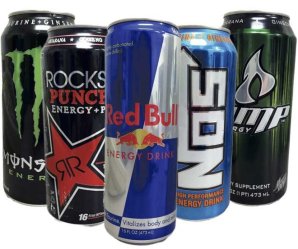 By Sierra Akana
By Sierra Akana
College students are consuming energy drinks like Red Bull and Monster Energy to increase their productivity. The benefits of added energy is helpful but the issues from overconsumption are concerning.
“An energy drink is a beverage that contains caffeine in combination with other ingredients such as sugar, amino acids, herbal extracts and B vitamins,” wrote Natalie Poulos and Keryn Pasch in the article “Energy drink consumption is associated with unhealthy dietary behaviours among college youth” published November 2015.
According to the Centers for Disease Control and Prevention, 34 percent of 18 to 24 year olds consume energy drinks and they are doing it for a few reasons.
Energy drinks provide mental and physical stimulation that boosts stamina due to the ingredients.
The main ingredient found in these beverages is caffeine, which is also found in coffee and tea. Though energy drinks might not have as high a level of caffeine as a Starbucks coffee, the combination of caffeine and other ingredients can create stronger reactions.
Other ingredients in these drinks include the following: taurine, which is an amino acid that helps maintain organs and cells; guarana, which is a plant that is similar to caffeine and produces a similar effect; and B vitamins, which is a type of supplement found in foods like fish, poultry, meat and dairy.
The effects of energy drinks are two-fold.
On the positive side, some students drink these beverages to find increased physical endurance and mental acuity. It can help students deal with the fast-paced college life.
“Energy drinks provide me that extra push to get through the day and maximize productivity,” said Patrick Viado, College of Southern Nevada student who drinks an energy drink daily during the school week. “I’m able to crack open a textbook, take notes and study them without any problem. Energy drinks allow me to focus on the task at hand and I am less susceptible to distractions.”
On the negative side, there are dangers to drinking too many energy drinks: nervousness, irritability, insomnia, rapid heartbeat and increased blood pressure, according to the Mayo Clinic’s report “Can energy drinks really boost a person’s energy” published February 2015.
The Caffeine Informer, which presents facts and research to consumers, suggests other issues can result from drinking too many energy drinks: cardiac arrest, migraines, headaches, anxiety, vomiting, allergic reactions and addiction.
“Drinking too much energy drinks can make your body dependent on them and you won’t be able to function properly without them,” said Roland Magbanua, CSN student.
“Primarily I think college students use energy drinks because they don’t get enough sleep,” said Denise Signorelli, professor of nutrition at CSN.
“Many college students replace healthy calories they need that have vitamins, minerals, proteins and complex carbohydrates with sugar calories,” Signorelli said. “That is bad for overall health. If they are not replacing calories but just adding calories on top of the food they require, energy drinks can throw off caloric balance and result in weight gain.”
According to Signorelli there are healthy alternatives to increase energy and improve health: eating fruits and vegetables, drinking water and sleeping a minimum of seven hours per night.




